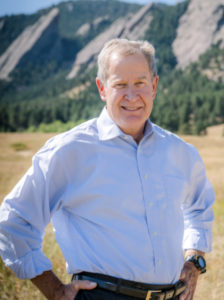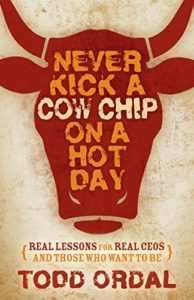Todd Ordal: CEO Coach
by Carla Fleming of Pivoting Strategies | original post can be found here.
 “I walked into my office, and I thought, my phone has not rung for months,” said Todd Ordal.
“I walked into my office, and I thought, my phone has not rung for months,” said Todd Ordal.
The CEO role and the internal capabilities required to grow a company are rapidly being redefined. The New CEO is grappling with a:
- Shift from shareholder to stakeholder
- Seismic demographic, ethnic, and gender transference from Baby Boomers to Gen Xers, Millennials, and Gen Zers
- Reimagination of physical to digital products and multiple services
- Recognition that understanding customer behaviors, not transactions, are redefining customer relationships,
- Realization that we’re in a Gilded Age where the veneer of everything is great to the Authenticity Age where leaders, consumers, and communities are leveraging social business and corporate social responsibility to solve the challenges we face.
If I had one word to describe Todd Ordal, President of Applied Strategy it would be Coach. A coach to CEOs for mid-cap companies with revenues in the $50 million to $2 billion range for almost 15 years. He is the former CEO of two medium-size companies: a sporting goods and design wholesale firm and a learning disabilities company. He was also the former Division President of Kinko’s. As Todd notes, he has the scars and the lessons he’s learned along the way that informs how he thinks about the CEO role.
In Part One of the four-part series, we’ll discuss how Todd’s corporate career path prepared him for becoming a CEO.
_________________________________
Carving a Path to CEO
Carla A. Fleming (Fleming): You’ve had a really interesting career start. You started off at Kinko’s, moved up to Division President, were CEO of several smaller companies and then you up and decided to go out on your own. What made you jump out?

Todd Ordal (Ordal): I was there before FedEx bought Kinko’s. There were 128 different groups under one kind of umbrella organization. We rolled it together and packaged it and sold it.
To help participate in that which was a lot of fun; it was a big deal. A firm out of New York, called Clayton Dubilier & Rice, was a large private equity firm that bought it. They purchased Kinko’s once we had rolled it together. I got to work with Goldman Sachs and those folks to help do that.
Once they bought in, I was in the Division President’s role for three years, reporting to the CEO. Then things started to change and the culture was misunderstood by investors. It was a very large job, with 7,000 people in my division. I was learning a lot, but I was concerned.
Three years into that job they brought in a new guy that I reported to that I had no respect for. After a few months, it became clear to me that I could not work for him and I left. While that was difficult for me, I am very glad I did.
Fleming: Wow! That’s bold.
Ordal: He was unethical, what was I going to do? So, I just called him and said I’m done. Let’s get this over with.
I took a bunch of time off and then got into the smaller company world. But my experience is that the leadership thing transfers well. I don’t think the industry experience at the C-level is necessarily as important as some folks make it out to be.
For me, it wasn’t difficult to get into those other roles because you sit down, and you say what are the questions I have to ask here? Where do I play? How do I win? How do I create an aligned and committed team? What should I be spending my time on verses my other folks? Where can I add the most value? If you come up with the list of questions, it can guide you through; I don’t care whether you’re selling ice-cream or textbooks.
So, for me, it wasn’t that weird to go to different industries.
Fleming: What was it like when you entered your first CEO job?
Ordal: Well, I had to go beat the bushes for the first time in my career. After spending twenty years at Kinko’s, I took some time off. I skied 45 days that year and took my kids to Ireland. I think I took 14 months off before I started looking. And, I thought, here we go.
I walked into my office and I thought, my phone has not rung for months. So, I guess I have to make the phone ring. So, yeah, I stumbled into a private equity group that hired me. It was a turnaround situation. A founder-led organization that had gotten themselves into a whole world of hurt.
So that’s how I got started. I just sort of networked my way into it until I found something that was a fit. It was an interesting experience. I had a conversation this morning with a guy who’s kind of in our boat. He had started a company and got consumed by a larger company and ended up with a whole bunch of stock in the larger company. Then they did something and he ended up basically walking out with very little.
He started consulting. And, he had this interesting way of putting it. He said, “The lights went out for me.” We were discussing what happens when you leave a significant role, and you’re no longer there. My experience is a lot of people I thought were my friends, were not.
They used to call me once a week. “Let’s go play golf or whatever.” Then you are out of the big job, and they don’t call. And the way he described it is – we were talking about another mutual friend – and he said, “The lights went out for me. When I turned them back on, there were only a handful of people in the room.”
It was my friend, Scott’s sitting on the couch, saying, “What can I do to help you?” But he said a lot of people I thought were friends, were no longer in the room. Which I thought was a great way to describe it. I had the same experience. So, I just had to go out and start beating the bushes, which I actually kind of enjoyed. It’s an ego-busting exercise.
At Kinko’s, we were a huge customer for Xerox and I knew the senior people. They’d go, “Hey, should we send the jet? We’ll pick you up to play golf.” I went from that to nothing.
We had a fleet of administrative assistants at one point. And, I went, you know what it’s like when you’re on your own. So, the whole thing was quite ego-busting. But once you get through that, it’s alright.
Fleming: I think, it’s kind of liberating.
Ordal: Yes.
Fleming: It sounds like you’ve grown as well.
In Part 2 of our series we’ll discuss what Todd Ordal’s experience was like when he became a CEO, what the role of a leader is, how a CEO should manage their relationship with the board, and why it’s critical to know when to leave.Ordal: Yes, it’s a completely different world for me now. But I enjoy what I’m doing a great deal. I enjoy the flexibility and the freedom. I like helping these CEOs. I enjoy the challenge. Sometimes the tougher the assignment, the more fun it is.
 In “Never Kick a Cow Chip on a Hot Day: Real Lessons for Real CEOs and Those Who Want to Be,” Todd Ordal discusses what he learned when he sat in the CEO role and what executives who want to become CEOs need to learn about themselves, their teams, and their company to be successful.
In “Never Kick a Cow Chip on a Hot Day: Real Lessons for Real CEOs and Those Who Want to Be,” Todd Ordal discusses what he learned when he sat in the CEO role and what executives who want to become CEOs need to learn about themselves, their teams, and their company to be successful.
Carla A. Fleming is CEO and Founder of Pivoting Strategies, a business strategy consulting firm. She works with CEOs of middle-market companies interested in building their internal capabilities for growth. Follow “The New CEO” blog where we interview CEOs and Founders as they evolve their companies for growth.

coaches CEOs to higher levels of success. He is a former CEO and has led teams as large as 7,000 people. Todd is the author of, Never Kick a Cow Chip On A Hot Day: Real Lessons for Real CEOs and Those Who Want To Be (Morgan James Publishing).
Connect with Todd on LinkedIn, Twitter, call 303-527-0417 or email [email protected].
